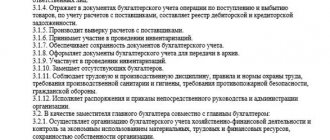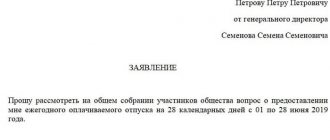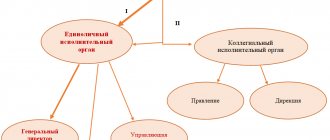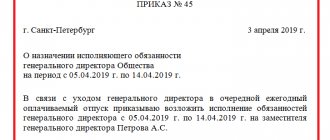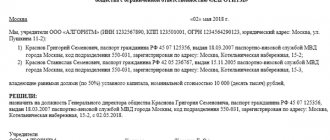The Deputy General Director is a hired employee belonging to the cohort of administrative employees. Or, in modern language, to the “top management” of the company. Appointed to the position, as a rule, directly by the General Director. Or a general meeting of company participants, a board of directors, shareholders: depends on the form of work and ownership of the enterprise (LLC; OJSC, etc.).
When drawing up a job description for the Deputy General Director, they are guided by the functional responsibilities of this employee. In fact, “Deputy General Director” is an incomplete job title. As a rule, the continuation follows: “... on safety”; “...on the administrative and economic side”; “... on financial issues” and so on - there can be many options. However, it is quite acceptable (especially in small companies) if the manager has only one deputy. Then it is appropriate to call him “Deputy General Director for General Affairs.” And he performs duties that in large corporations are distributed among several deputies. Moreover, the scope of work of a small company differs significantly from a mega-holding.
DEPUTY GENERAL DIRECTOR
1. General Provisions
1.1. This job description defines the functional duties, rights and responsibilities of the Deputy General Director.
1.2. The Deputy General Director belongs to the category of managers.
1.3. The Deputy General Director is appointed and dismissed in accordance with the procedure established by law by order of the General Director.
1.3. A person with a higher professional (economics, legal) education and at least 5 years of experience in management positions is appointed to the position of Deputy General Director.
1.4. The Deputy Director General reports directly to the Director General of the Organization.
1.5. The Deputy General Director must know:
— legislative and regulatory acts regulating financial and economic activities
— basics of civil, commercial, financial, tax, labor legislation;
— profile, specialization, features of the organization’s structure, prospects for its development, production capacity, basics of production technology;
— the procedure for developing and approving plans for the production, economic and financial and economic activities of the organization;
— organization of the financial work of the company;
— the procedure for concluding and executing business and financial contracts.
1.6. The Deputy General Director is guided in his activities by:
— legislative acts of the Russian Federation;
— Charter, Internal Labor Regulations, other regulations of the organization;
— orders and instructions of the General Director;
- this job description.
1.7. During the period of temporary absence of the Deputy General Director, his duties are performed by a person appointed in the prescribed manner. This person acquires the corresponding rights and is responsible for the proper fulfillment of the duties assigned to him.
2. Labor functions and job responsibilities
2.1. The Deputy General Director is obliged to perform the following functions
:
2.1.1. Conducting financial and economic activities together with the General Director;
2.1.2. Participation in maintaining the personnel policy of the Company;
2.1.3. Representing the interests of the organization without a power of attorney within the competence of the Deputy General Director, in accordance with the Charter of the Company;
2.1.4. Exercising the functions of the General Director in the absence of the General Director, as well as in other cases when the General Director cannot perform his duties.
2.1.5. exercise of other powers in accordance with the Charter of the Company.
5.2. The employee is required to perform the following job duties
:
5.2.1. Carry out operational management of the financial and economic activities of the Company during the absence of the General Director.
5.2.2. Ensure the fulfillment of the Company's contractual obligations, directly in the absence of the General Director or on his instructions, negotiate with customers, contractors, subcontractors, potential partners and other organizations.
5.2.3. Ensure compliance with the law in the activities of the Company, compliance by the Company's employees with the requirements of local acts regulating the activities of the Company.
5.2.4. Ensure the safety of material assets belonging to the Company.
5.2.5. Manage the structural divisions of the Company.
5.2.6. Manage the financial and economic activities of the Company in the field of logistics, sales of products, performance of work, provision of services under the Company’s contracts, ensuring the effective and targeted use of material and financial resources, reducing their losses, accelerating the turnover of working capital.
5.2.7. Organize the participation of structural units subordinate to him in drawing up long-term and current plans for product sales, determining the long-term strategy of commercial activities and financial plans of the Organization.
5.2.8. Exercise control over the sale of products, performance of work, provision of services, material and technical support of the Company, financial and economic performance indicators, proper expenditure of working capital and targeted use of bank loans, termination of sales of products that do not have high sales figures.
5.2.9. Manage the development of measures for resource conservation and integrated use of material resources of the service department, improve the regulation of consumption of raw materials, supplies, working capital and inventories of material assets, increase operational efficiency, and strengthen financial discipline in the Company.
5.2.10. Ensure that the Company's employees comply with labor discipline and internal labor regulations.
5.2.11. Ensure proper record keeping and reporting required by current legislation.
5.2.12. Submit reports on your activities at the request of the General Director of the Company, the Company Participants, as well as submit an annual report on your activities in preparation for the General Meeting of the Company Participants.
5.3. The employee is obliged to comply with the internal labor regulations established by the Company, production and financial discipline, and conscientiously perform his job duties.
3. Rights
3.1. The Deputy General Director has the right:
3.1.1. act on behalf of the Company without a power of attorney;
3.1.2. represent the interests of the Company in all government and other bodies, organizations and institutions on the territory of the Russian Federation, in notary offices, banks and other credit organizations;
3.1.3. dispose of the property and funds of the Company within the limits established by the Charter, job description and current legislation of the Russian Federation;
3.1.4. issue orders and give instructions that are mandatory for execution by employees of all structural divisions of the Company, participate in the preparation of draft orders, instructions, instructions, as well as estimates, contracts and other documents, establish job responsibilities for employees;
3.1.5. in agreement with the General Director, hire and dismiss employees of the Company, including appoint and dismiss the heads of these departments;
3.1.6. open settlement, currency and other accounts in banks, enter into agreements and make other transactions within an amount not exceeding ______________________;
3.1.7. take part in determining contract prices for products and tariffs for work and services;
3.1.8. sign outgoing and payment documents within the scope of their competence;
3.1.9. report to the General Director about all shortcomings identified in the course of their activities and make proposals for their elimination;
3.1.10. request from structural divisions information and documents necessary to fulfill his official duties;
3.1.11. demand from management to ensure organizational and technical conditions and execution of established documents necessary for the performance of official duties.
4. Responsibility
4.1. In accordance with Articles 242 and 243 of the Labor Code, the Deputy General Director bears full financial responsibility for direct actual damage caused to the Company.
4.2. The Deputy General Director is also responsible for:
4.2.1. for improper performance or failure to fulfill their official duties - within the limits determined by the labor legislation of the Russian Federation;
4.2.2. for offenses committed in the course of carrying out their activities - within the limits determined by the administrative and criminal legislation of the Russian Federation.
5. Operating mode
5.1. The working hours of the forwarding driver are determined in accordance with the terms of the Labor Contract of the forwarding driver and the Internal Labor Regulations established by the Employer.
Deputy General Director
Names of holidays
In general, the first word and proper names are written with a capital letter in the names of holidays. The rest of the words, including “holy,” are lowercase. For example, “Submarine Day”, “Knowledge Day”, “St. Patrick’s Day”. If the name of a holiday begins with a number, then the noun after it is written with a capital letter - “March 8”, “February 23”. Note that a birthday, although a holiday for the birthday person and his loved ones, is not a nationally celebrated day, and therefore there is no reason to write this phrase in capital letters. Therefore, when wishing someone a happy birthday, use only lowercase letters in these two words. New Year as the name of a holiday is written with a capital letter, and as a statement of fact (the onset of the next calendar year) - with a lowercase letter. How to distinguish one from the other? Look at the context. For example, in the sentence “We celebrated the New Year well,” we are talking about a holiday, and in the phrase “With the New Year, I will start a new life,” we are talking about the coming of another year. A special nuance is associated with congratulations, because you can congratulate both on the holiday and on the advent of the new year. Remember this rule: if you simply write “Happy New Year!” , write with a capital letter; if “Happy new year, 20XX!” - then with a lowercase one (and don’t forget to put a comma after the word “new”). The logic here is this: the holiday is called “New Year” regardless of the year number. If you congratulate on the advent of a specific year, then you mean a period of time of 365 days, therefore, you need a lowercase letter and a comma, since the year number will act as a clarification.
Sample of a typical job description for a deputy general director
I. General provisions
1. The Deputy General Director belongs to the “managers” category.
2. The Deputy General Director reports directly to the General Director.
3. Appointment to the position of deputy general director and dismissal from it is carried out by order of the general director.
4. During the absence of the Deputy General Director, his functional duties, responsibilities, and rights are transferred to another official, as reported in the organization’s order.
5. A person with a higher economic or legal education and at least five years of experience in management positions is appointed to the position of Deputy General Director.
6. The Deputy General Director must know:
- regulatory legal acts regulating the financial and economic activities of the organization;
- civil, financial, tax, labor law;
- organizational structure of the company, production capacity, fundamentals of production technology;
- plans for the production, economic, financial and economic activities of the organization;
- procedure for concluding and executing contracts.
7. The Deputy General Director in his activities is guided by:
- legislative acts of the Russian Federation;
- Charter of the organization, Internal labor regulations, other regulations of the company;
- orders and instructions from management;
- this job description.
II. Job responsibilities of the Deputy General Director
The Deputy General Director is assigned the following functional responsibilities:
1. Control the financial and economic activities of the company.
- efficient use of material resources, reduction of losses, acceleration of funds turnover;
- timely conclusion of business and financial agreements;
- fulfillment of contractual obligations.
- development of measures to save resources;
- improving the costs of raw materials, materials, working capital and inventories of material assets;
- improvement of economic indicators;
- increasing the organization's performance;
- strengthening financial discipline;
- prevention of insufficient or excessive inventories of inventory items, overexpenditure of material resources.
4. Contribute to the timely preparation of financial estimates and other documents, calculations, and reporting.
5. Represent the interests of the organization in government and commercial institutions, within their competence.
- employees for compliance with labor and production discipline, labor protection rules, fire protection requirements;
- execution of orders and orders of the General Director.
7. Inform the General Director about the pace of work planned and measures to eliminate identified deficiencies.
III. Rights
The Deputy General Director has the right:
1. Involve other officials of the organization in solving the tasks assigned to him.
2. Appoint persons responsible for performing the established work.
3. Develop and sign documents within your competence.
4. Represent the interests of the organization by proxy in government bodies, before contractors and other parties.
5. Make independent decisions within your competence.
6. Participate in the preparation of orders, instructions, instructions, estimates, contracts and other documents.
7. Inform the General Director about all identified shortcomings in the process of their activities and make proposals for their elimination.
8. Determine job responsibilities for subordinate employees.
9. Request information and documents necessary to perform your own job duties.
10. Put forward demands on the organization’s management to ensure conditions for the performance of functional duties.
IV. Responsibility
The Deputy General Director is responsible for:
1. Providing false information.
2. Causing material damage to the organization, the state, its counterparties, and employees.
3. Violation of decisions, resolutions, provisions of the organization’s management.
4. Disclosure of trade secrets, personal data, confidential information.
5. Improper performance of one’s own official duties.
6. Violation of labor discipline, safety regulations, internal labor regulations, fire protection.
Introduction
It is the manager who decides when exactly to appoint a deputy - he can introduce the position in parallel with the signing of documents on taking up the position, in the process of work, or create it as a reserve parachute if he wants to leave (the deputy is appointed as an assistant, gets involved in all matters and after the dismissal of the general, takes his place) . The position itself can also have different names: vice president, deputy, executive director.
What exactly are the responsibilities of this person? It all depends on the specifics of the enterprise, the decision of the manager or founders.
Example:
The general director and founder of Dal LLC deals exclusively with production issues at the enterprise. The company is successfully growing and developing, and it needs strong legal and economic support. The general director introduces the position of deputy for economic and legal issues, relieving himself of all responsibilities in these areas, exercising only general control over the state of affairs.
At the same time, the deputy has the right to build the entire chain necessary for him to work effectively with the permission of the head of the company: create a legal and economic department, hire specialists, regulate their activities, etc. Often the general director decides to develop strategic plans, search for new directions, capture new markets or define promising paths, freeing yourself from routine and routine. In this case, he can also hire an assistant, transferring all the main tasks to him and limiting himself to only general supervision and consulting of a specialist.
Who should be selected for the position of Deputy General Director? There is no definite answer - it all depends on the specifics of the company’s work and on what exactly is required of him . But in general, we can identify a generalized portrait of a person for this position based on requests and vacancies:
- A man aged from 27 to 33 years.
- Higher technical or economic education.
- Experience in the field in question for at least 1 year.
- Adequacy, the ability to organize a work process, monitor the execution of one’s orders.
- Independence, leadership skills, responsibility.
Many managers prefer to hire technicians because they have well-structured knowledge, they know how to build effective management schemes and approach the process from a practical perspective. Deputies with two degrees are popular: technical and legal.
Who is selected for the position (generalized portrait)
Answer the question of who can take the post of deputy. gene. director, quite difficult. Here it is necessary to take into account not only the job responsibilities of the future employee, but also the direction of the organization’s activities . Based on most of the requirements for applicants for this position, we can draw up a generalized portrait of the best candidate for this position:
- A man between twenty-seven and thirty-three years old.
- Having a higher economic or technical education.
- Practical experience in the field in question for more than one year.
- Ability to organize the work process.
- Availability of leadership qualities, complete autonomy and a high level of responsibility.
As practice shows, people with a technical background cope better with the responsibilities of an executive director due to the presence of structured skills. Such people easily create workflow management schemes that bring maximum results. Many managers of large companies prefer to choose candidates who have two higher educations.
Responsibilities of the Deputy
Before considering the job responsibilities of the Deputy General Director, you should decide exactly what issues he will deal with. There are several directions for this vacancy:
- First Deputy. In fact, he is the right hand of the manager, deals with most production issues, replaces the boss in his absence, has the right to sign agreements, documents, contracts, etc.
- Deputy for General Affairs. Usually has less authority than the first deputy, deals with turnover and partly with personnel.
- Deputy for Legal Affairs. Serious demands are placed on this specialist, because today the performance of the entire company depends on the quality of legal support.
- Deputy for economic issues, sales, marketing. Engaged in product promotion and responsible for the company's profitability.
- HR deputy, technical manager, etc. They solve tasks specifically tailored to them; they are usually present only at large enterprises where there are departments dedicated to specific responsibilities.
Who hires a deputy and creates documentary support for him? This is usually done by the CEO or board of the company. A job description is an internal document that plays a managerial and organizational role . It defines the rights and obligations of the deputy and is signed by the head of the company (or his authorized representative).
Tasks
The tasks of a deputy have much in common with the tasks of the general director. The only difference is in responsibility, as well as in the level of awareness. The deputy must be well versed in general economic issues, know tax legislation, contract law, and understand accounting. But that's not all. He needs to know the operation of the programs used by the enterprise, since he may be responsible for drawing up relevant reports.
What does the instruction consist of?
The job description of the First Deputy General Director includes the following paragraphs:
- General provisions (to whom exactly does the employee report).
- Job responsibilities of a person (what exactly he should do in the company. The more precisely the responsibilities are described, the fewer controversial situations there will be in the process and the less blurred the responsibility).
- Rights of a person. Here is a list of exactly what rights an employee can count on.
- Employee responsibility. The deputy general is a responsible position, therefore the document indicates what responsibility the employee bears for his actions or inactions (up to financial liability).
Let's look at the points listed above in more detail.
General provisions
This section usually indicates to whom the employee reports. As a rule, this is the head of the company, but there may be other options (first deputy, owners, etc.). In general, the first paragraph provides general information about the company and position. It must be written down what issues the employee will supervise, what processes are focused on him . The procedure for appointment and removal from a position is also prescribed here (usually this is done by order of the general or in accordance with the company’s charter). The general provisions also stipulate who exactly will perform the duties of the DDG in his absence or illness, as well as the requirements for the employee’s qualifications, knowledge and skills.
Job responsibilities
This point is considered key - its drafting should be approached with all responsibility, having thought through the structure in advance and calling on an experienced lawyer for help. Typically this includes:
- Resolving issues assigned by the manager.
- Control over production processes within his area of activity.
- Organization of work of entrusted departments.
- Coordination of various departments and groups of employees.
- Monitoring the implementation of plans and compliance with assumed responsibilities.
- Providing supervised departments with everything necessary to prevent downtime.
Rights of the Deputy
Having listed the main functions of the deputy general director, his rights should also be noted. What they will be depends on the company itself. Roughly speaking, the rights of the DDG are the list of capabilities that he is endowed with to solve current problems and everyday issues. Be sure to indicate who he has the right to manage, from whom he can demand results, in what area he can make proposals and carry out his activities. Key features include:
- Distribution of workloads among departments and subordinates.
- Requiring employees to comply with the rules for working with documents and information.
- Making proposals for rewards and punishments for employees/departments.
- Making proposals to optimize the work process.
- Drawing up contracts and documents, personnel issues.
Responsibility of the DGD
The last paragraph lists what exactly the employee is responsible for. His area of responsibility includes:
- Efficiency of work of entrusted areas and departments.
- Achieving set goals and indicators.
- Security of property and information.
- Inaction or insufficient action, as a result of which damage was caused to the enterprise.
Thus, it is the deputy who must monitor the implementation of planned values, monitor the discipline and performance of employees, provide reports to higher authorities or founders, submit declarations to the relevant authorities and organize the work process.
Conclusions (+ video)
The deputy head of the company must deal with many organizational issues that are important for the organization's activities. As a rule, the need for such an employee arises at the stage of business expansion, when members of the founding board and the head of the company are engaged in drawing up long-term plans. During this period of time, the vice president must deal with short-term problems that are important for the company's operation. From all of the above, we can conclude that the position in question is one of the main ones in every company.

